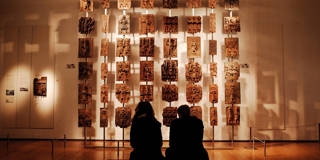The delayed repatriation of the Benin Bronzes has evolved into an international test case for the return of treasures stolen during the colonial era. This fiasco could have been avoided had both parties paid attention to the warning signs and taken measures to prevent the process from being politicized.
BERLIN – Until recently, the protracted saga of the Benin Bronzes’ repatriation appeared to be heading toward a satisfying conclusion. These sculptures and artifacts, looted by British soldiers in 1897 during a raid on the historic Kingdom of Benin (in what is now Nigeria’s southern state of Edo) and scattered across Europe and North America, were set to return to Nigeria. But their status is once again uncertain.
The campaign for the return of the Benin Bronzes took an unexpected turn on March 23, when outgoing Nigerian President Muhammadu Buhari declared Ewuare II, the Oba (King) of Benin and traditional ruler of Edo, their rightful owner. Buhari’s announcement “blindsided” museums in Germany, the United Kingdom, and the United States, delaying the restitution of the bronzes. Worse, the declaration threatens to privatize the process, as well as the statues and plaques that have already been returned, thereby jeopardizing several ongoing negotiations to return stolen cultural property from former colonial powers.
At first glance, these developments may seem perplexing. But a closer examination reveals a complicated story that offers important lessons for the global movement to return stolen national treasures.

BERLIN – Until recently, the protracted saga of the Benin Bronzes’ repatriation appeared to be heading toward a satisfying conclusion. These sculptures and artifacts, looted by British soldiers in 1897 during a raid on the historic Kingdom of Benin (in what is now Nigeria’s southern state of Edo) and scattered across Europe and North America, were set to return to Nigeria. But their status is once again uncertain.
The campaign for the return of the Benin Bronzes took an unexpected turn on March 23, when outgoing Nigerian President Muhammadu Buhari declared Ewuare II, the Oba (King) of Benin and traditional ruler of Edo, their rightful owner. Buhari’s announcement “blindsided” museums in Germany, the United Kingdom, and the United States, delaying the restitution of the bronzes. Worse, the declaration threatens to privatize the process, as well as the statues and plaques that have already been returned, thereby jeopardizing several ongoing negotiations to return stolen cultural property from former colonial powers.
At first glance, these developments may seem perplexing. But a closer examination reveals a complicated story that offers important lessons for the global movement to return stolen national treasures.